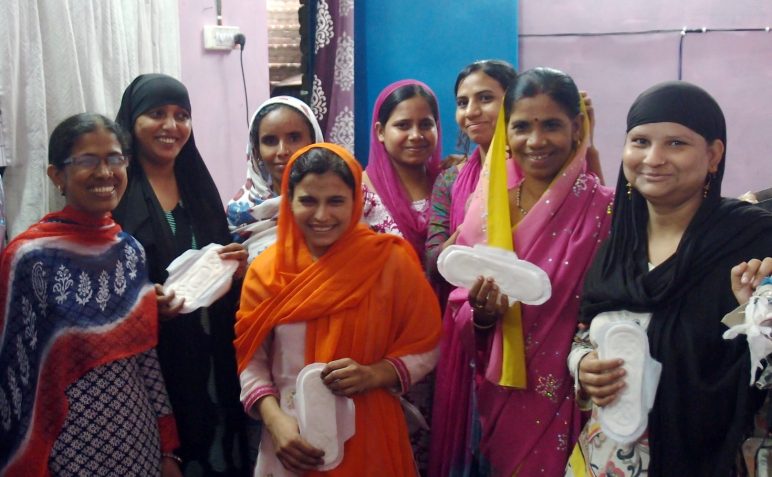If you put sheets of raw materials into grinders, weigh them and put them into molds, so on with a total of 22 steps, you would have produced the pads necessary for every woman during her menstrual period. Pushpa was able to learn these steps and sustain her family by selling self-made pads with the help of the Lydia Center in New Delhi, India.
Pushpa’s husband passed away 7 years ago and left her to be the sole supporter of her son and herself. They were since living in poverty where Pushpa’s income could barely afford her son’s education. Adding insult to injury, her employer had been delaying her salary payment for nine straight months, that is when she was invited to receive the pads production training that lasted for 2 weeks. The profit of selling the self-made pads alleviated Pushpa’s financial situation. “Of course I was happy to make a profit from selling these pads, but the most fulfilling thing is to teach the young women using a pad instead of dirty used scraps (during their menstrual period).” Said the excited Pushpa.
Commercially available pads are a luxury for a lot of women in the slums who in turn use fabric scraps when necessary. Using cotton scraps as pads are suspect to causing infections in the users since fresh washing water is hard to come by in the slums, and because of the humidity that encourages bacterial growth in the fabrics when they are hanged to dry.
The SPTWD (Society for Promotion of Tribal Welfare and Development), an organization supported by CEDAR’s partner, EFICOR (The Evangelical Fellowship of India Commission on Relief), was aware of the sanitation needs of the local women, and started the menstrual pads production training project in 2015 which helped the women in earning extra income and having more sanitized options during their period. The self-made pad only cost around a third of some internationally known brands, and is well-received by its users, hence it is much more cost effective. Also, women could now be free from potential pressures from some disrespectful male retailer staff. The project not only improved the women’s health but also empowered them to be able to leave home and attend school during their period, which would hopefully debunk the traditional scrutiny that says women are dirty during their period. Eventually, the buyers and sellers of the pads could restore their dignity and confidence in their daily lives.
Thanksgiving and Prayer Items:
- Praise God and pray for the continuation of the success of the project that helped improving the living conditions of the women. Pray for the breakthrough of more women that they would understand the value and dignity given to them by God in His creation, and to lead a confident life.
- Pray for the operation of the project and God’s provision in the machines, raw materials, and labor vital to the project. Pray for the speedy fixing of 2 machines, and more stable raw material supplies so more women could participate in the production.
Other Methods of Payment
- Cheque payable to ‘CEDAR FUND’
- Deposit to HSBC A/C No. 600-385678-001, enclosing with the Pay-in slip
- Autopay (only applicable to regular fixed donations), enclosing with a completed Autopay Authorisation Form (Download: PDF)
- Visa/ Master Card
Download Donation Form
Please send a completed Donation Form, enclosing with cheque or pay-in slip, to CEDAR FUND, G.P.O. BOX 3212, HONG KONG.
Donation Form: PDF
[1] CEDAR is an approved charitable institutions and trusts of a public character under section 88 of the Inland Revenue Ordinance. Please click Inland Revenue Department website to check for details.
[2] Donations over $100 are tax deductible in Hong Kong with our receipts.
[3] Please DO NOT fax any donation information.





